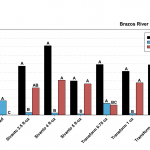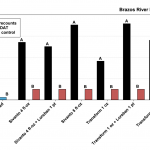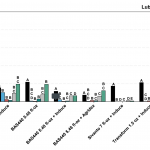Evaluating Best Use Scenarios for Insecticides Targeting Sugarcane Aphid— Based on small plot trials, normal use rates of Transform 1-1.5 oz/ac and Sivanto 4-5 fl-oz/ac continued to provide adequate control of SCA. Low rates, Transform 0.75 oz and Sivanto 2.5 fl-oz (below labelled rate) may have a fit late season near harvest on low SCA populations when lengthy residual control is not necessary. We did not see any benefit from tank mixing either Transform or Sivanto with Lorsban. The new insecticide being developed by BASF, BAS 440I, appears to be a good candidate as an additional product for SCA management. Based on our data, it appears to be slower acting than Transform and Sivanto, and appears most active at rates of 6 fl-oz or more. Residual control from BAS440I appears to be around 21 days; better than Transform but not as long as Sivanto. Because of low SCA numbers we were not able to draw many conclusions regarding the activity of Sivanto applied infurrow at planting. Bioassay data suggests that Sivanto at 4 fl-oz/ac infurrow results in significant SCA mortality at 30 DAP, but very little at 38 DAP. However, we do not think this necessarily reflects inactivity at 38 DAP, but may indicate that the mode of activity may be primarily due to preventing reproduction or killing new born aphids rather than killing adult aphids. Large plot demonstration trials suggest that there is typically not a great deal of difference between the activity of Transform or Sivanto applied via aerial application or by ground, and that standard use rates, Transform at 1 oz/ac or Sivanto at 4 fl-oz/ac will usually suffice.
Principal investigator: David Kerns; Other Investigators: Katelyn Kesheimer, Blayne Reed, John David Gonzales, Kerry Siders, Xandra Morris, Scott Strawn
Figure 1: Efficacy of Sivanto and Transform at high, normal and low rates on SCA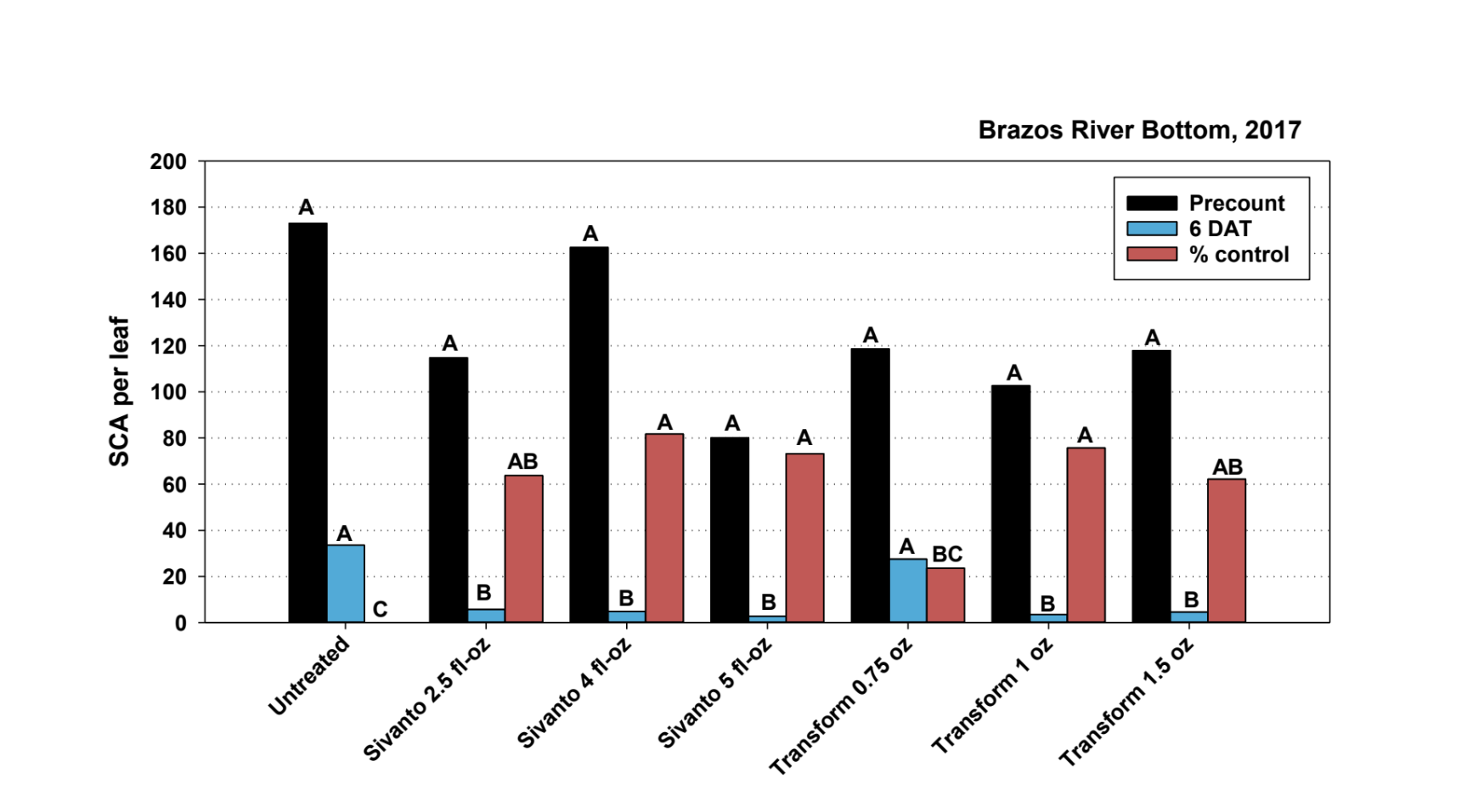
Figure 2: Efficacy of Sivanto and Transform mixed with Lorsban to SCA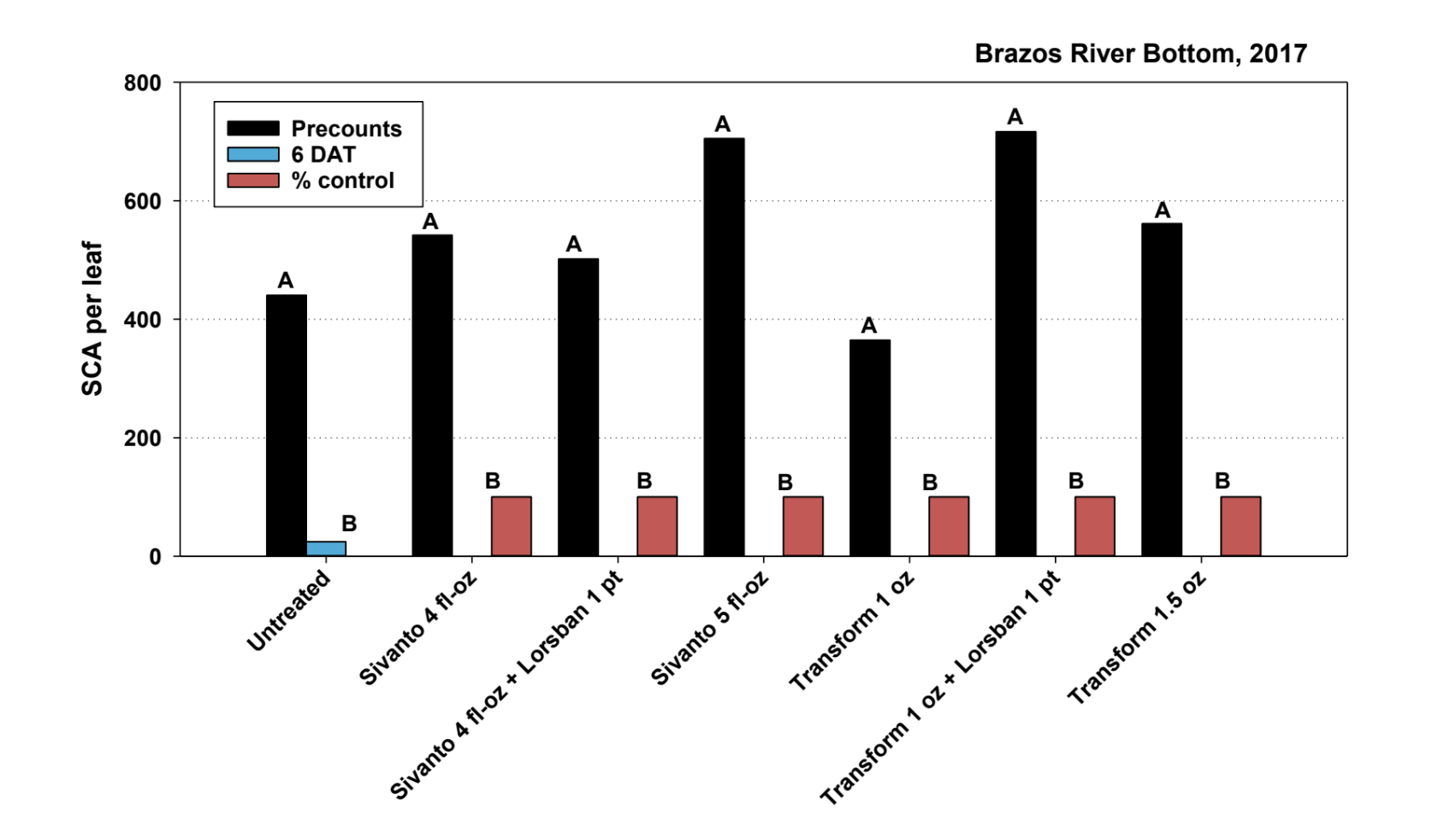
Figure 3: Efficacy of BAS440 relative to varied rates of Sivanto and Transform to SCA
If you would like additional charts or information regarding this study, email katelyn@texassorghum.org
EPA Proposes Grain Sorghum Oil Pathway –The Environmental Protection Agency issued a Proposed Rule in the Federal Register today on the life-cycle greenhouse gas (GHG) emissions associated with biofuels that are produced from grain sorghum oil extracted at dry-mill ethanol plants.
EPA is seeking comment for 30 days on its proposed assessment that using distillers sorghum oil as a feedstock results in no significant agricultural sector GHG emissions. Through EPA analysis, biodiesel produced from distillers sorghum meets the lifecycle GHG emissions reduction threshold of 50 percent required for advanced biofuels, and biomass-based diesel under the Renewable Fuel Standard program.
“After almost four years of work by National Sorghum Producers industry partners and staff, we are excited to see this proposed rule in the Federal Register, putting us one step closer to sorghum oil filling biodiesel production needs,” said John Duff, NSP Strategic Business Director. “This is significant positive news for sorghum producers and ethanol plants in the Sorghum Belt as it provides more opportunities and better returns producing ethanol from sorghum.”
The proposed rule is a result of a petition filed by NSP and extensive work with the EPA providing data and analysis during the rule making process. A pathway approval will allow the production of biodiesel and heating oil from distillers sorghum oil, and renewable diesel, jet fuel, heating oil, naphtha, and liquefied petroleum gas (LPG) produced from distillers sorghum oil.
“This news is much anticipated, and we sincerely appreciate the help of our renewable energy partners, ethanol plants and producer leaders,” NSP CEO Tim Lust said. “We are also grateful for all the congressional leaders who signed a supporting letter and Senator Jerry Moran, Congressman Roger Marshall and Congressman Jodey Arrington who made calls to the EPA supporting the pathway, as well.”
For more information click here.
FSA State Committee Appointees Announced—U.S. Secretary of Agriculture Sonny Perdue today announced a slate of FSA State Committee Appointees. State committees are selected by the Secretary, serve at the pleasure of the Secretary, and are responsible for carrying out FSA’s farm programs within delegated authorities.
The appointees from Texas are below, to view members from each state, click here.
- Committee Chair Jerry Harris – Dawson/Gaines County
- Juan Garcia – Willacy County
- Rodney Schronk – Hillsboro
- Michael Skalicky – Ganado
- Linda G. Williams – Dumas
2018 District 11 Texas Crop and Livestock Budgets— 2018 budgets from Texas AgriLife are available here.
MidTex Farm, Ranch and Garden Show–Visit us in Waco this week!

